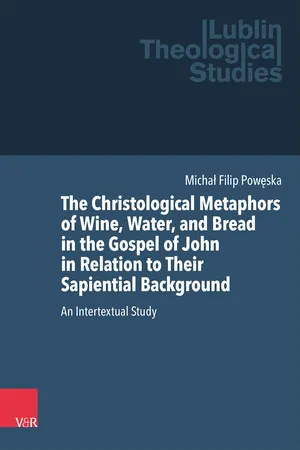
eBook - PDF
The Christological Metaphors of Wine, Water, and Bread in the Gospel of John in Relation to Their Sapiential Background
An Intertextual Study
- 420 pages
- English
- PDF
- Available on iOS & Android
eBook - PDF
The Christological Metaphors of Wine, Water, and Bread in the Gospel of John in Relation to Their Sapiential Background
An Intertextual Study
About this book
When focusing on the sapiential traits in text of the Fourth Gospel, it should be noted that in its images of wine, water, and bread, connected by the common theme of eating and drinking, one can see Jesus the Giver, who, like the Old Testament personified wisdom, bestows his gifts on man. Although single references to the Old Testament sapiential texts have been suggested for the Johannine images of wine, water, bread, light, and the vine, no detailed study of these images, as well as their juxtapositions even in the aspect of eating and drinking, has been published so far. The selected topic seems to be important for showing a comprehensive approach to the Johannine banquet motif in its sapiential aspect, broken down into particular Johannine images, which are the events related to wine, water, and bread. It is ultimately significant to present Jesus' full identity through these three metaphors, referring to the personified and preexisting wisdom as described in the Old Testament sapiential literature.
Frequently asked questions
Yes, you can cancel anytime from the Subscription tab in your account settings on the Perlego website. Your subscription will stay active until the end of your current billing period. Learn how to cancel your subscription.
No, books cannot be downloaded as external files, such as PDFs, for use outside of Perlego. However, you can download books within the Perlego app for offline reading on mobile or tablet. Learn more here.
Perlego offers two plans: Essential and Complete
- Essential is ideal for learners and professionals who enjoy exploring a wide range of subjects. Access the Essential Library with 800,000+ trusted titles and best-sellers across business, personal growth, and the humanities. Includes unlimited reading time and Standard Read Aloud voice.
- Complete: Perfect for advanced learners and researchers needing full, unrestricted access. Unlock 1.4M+ books across hundreds of subjects, including academic and specialized titles. The Complete Plan also includes advanced features like Premium Read Aloud and Research Assistant.
We are an online textbook subscription service, where you can get access to an entire online library for less than the price of a single book per month. With over 1 million books across 1000+ topics, we’ve got you covered! Learn more here.
Look out for the read-aloud symbol on your next book to see if you can listen to it. The read-aloud tool reads text aloud for you, highlighting the text as it is being read. You can pause it, speed it up and slow it down. Learn more here.
Yes! You can use the Perlego app on both iOS or Android devices to read anytime, anywhere — even offline. Perfect for commutes or when you’re on the go.
Please note we cannot support devices running on iOS 13 and Android 7 or earlier. Learn more about using the app.
Please note we cannot support devices running on iOS 13 and Android 7 or earlier. Learn more about using the app.
Yes, you can access The Christological Metaphors of Wine, Water, and Bread in the Gospel of John in Relation to Their Sapiential Background by Michał Filip Powęska, Adam Kubiś,Nicholas Adams,Marek Jagodziński,Pawel Mąkosa in PDF and/or ePUB format, as well as other popular books in Theology & Religion & Christian Theology. We have over one million books available in our catalogue for you to explore.
Information
Table of contents
- Cover
- Title Page
- Copyright
- Table of Contents
- Acknowledgements
- Introduction
- I. Methodological Issues
- II. The Metaphor of Wine
- III. The Metaphor of Water
- IV. The Metaphor of Bread
- V. Conclusions
- List of Abbreviations
- Bibliography
- Index